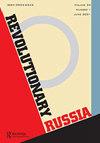Profit under the Soviets: Timber Concessions, Western interests and the Monetary Reforms under NEP
IF 0.2
2区 历史学
Q2 HISTORY
引用次数: 0
Abstract
In 1921, at the beginning of the New Economic Policy (NEP), V.I. Lenin pointed to the timber industry of the North as a promising opportunity for cooperation with Western interests and the Soviet state soon introduced timber concessions. However, these concessions were not particularly profitable and ended up as a short-lived experiment. This article analyses why timber concessions failed to make a profit, a critical question for the NEP’s semi-capitalist economy. It finds that monetary reforms that began with the re-establishment of central banking in October 1921 and ended in May 1924 with the new ruble clearly contributed to the failures of the timber concessions. The relative stability of the new currency was seen as an important achievement, but with the exchange rate initially fixed, the new ruble became overvalued. Thus, the export of goods purchased in new rubles became less profitable, or simply unprofitable. This led to severe difficulties for timber concessions such as Russangloles, Russhollandoles and Russnorvegoles. We focus on the important Russnorvegoles concession. We also find that there were two occasions when this concession succeeded in circumventing the problem of the overvalued ruble for short periods, yet acting contrary to Soviet interests in this way contributed to the end of Western interests in the company.苏联时期的利润:木材特许权、西方利益与新经济政策下的货币改革
1921年,在新经济政策(NEP)开始时,V.I.列宁指出北方的木材工业是与西方利益合作的一个有希望的机会,苏联国家很快就推出了木材特许经营权。然而,这些让步并不是特别有利可图,最终只是一次短暂的实验。本文分析了木材特许经营权未能盈利的原因,这是新经济政策半资本主义经济的一个关键问题。它发现,从1921年10月中央银行的重建开始,到1924年5月以新卢布结束的货币改革,显然是木材特许经营权失败的原因之一。新货币的相对稳定被视为一项重要成就,但随着汇率最初固定,新卢布被高估了。因此,以新卢布购买的商品出口变得不那么有利可图,或者根本无利可图。这导致了Russangles、Russhollandoles和Russnorvegoles等木材特许经营权面临严重困难。我们专注于重要的俄罗斯租界。我们还发现,有两次,这一让步成功地在短期内规避了卢布估值过高的问题,但以这种方式违背了苏联的利益,导致了西方在该公司的利益终结。
本文章由计算机程序翻译,如有差异,请以英文原文为准。
求助全文
约1分钟内获得全文
求助全文

 求助内容:
求助内容: 应助结果提醒方式:
应助结果提醒方式:


